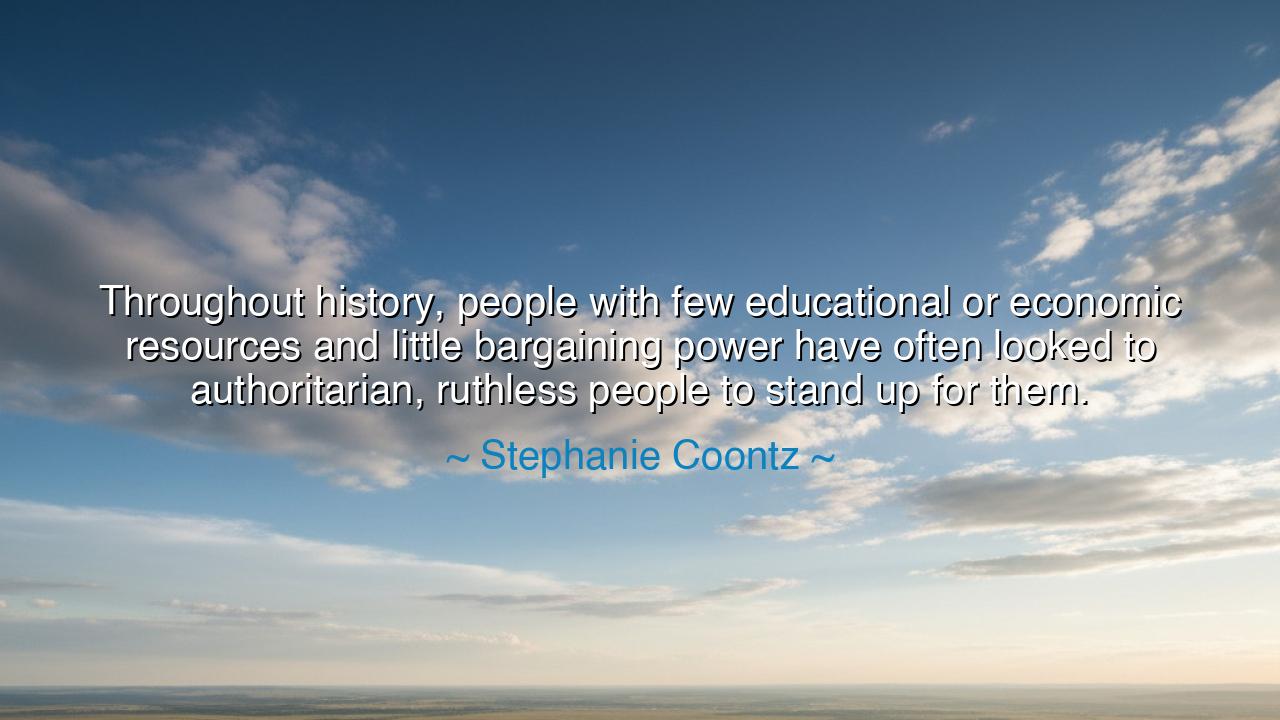
Throughout history, people with few educational or economic
Throughout history, people with few educational or economic resources and little bargaining power have often looked to authoritarian, ruthless people to stand up for them.






“Throughout history, people with few educational or economic resources and little bargaining power have often looked to authoritarian, ruthless people to stand up for them.” – Stephanie Coontz
Listen, O seekers of wisdom, to the words of Stephanie Coontz, a scholar of society and time, whose insight pierces the veil of history and reveals a truth that repeats across the ages. She speaks not in judgment, but in lamentation and understanding—that those with little power, stripped of wealth, knowledge, and influence, often turn their eyes to the strongman, the ruthless leader, the one who promises protection in exchange for loyalty. It is a pattern as old as civilization itself—a cycle of hope and betrayal, born from desperation and the human hunger for security.
When Coontz says, “people with few educational or economic resources and little bargaining power have often looked to authoritarian, ruthless people to stand up for them,” she unveils the sorrow of the oppressed. For when the people are unheard, when the halls of justice echo only with the voices of the rich, when laws are bent by the powerful, the poor seek not virtue, but strength. They cry out for a champion who will shatter the chains that bind them. And too often, it is the ruthless who answer—those who wield fear like a sword, who promise salvation but deliver submission.
Consider the rise of Julius Caesar in ancient Rome. The republic had grown corrupt, its senators fat with greed while the people starved. The citizens, weary of broken promises, saw in Caesar a man of action, a soldier who would restore dignity to Rome’s commoners. And for a time, he did. But the blade of power is double-edged: the same strength that protects can also enslave. Caesar crossed the Rubicon not only against his enemies, but against the very spirit of the republic. The people who raised him up as savior found themselves subjects beneath an emperor’s rule. Thus, in their yearning for justice, they gave birth to tyranny.
This story has echoed again and again across the centuries. In the fires of revolutionary France, the poor turned to Napoleon Bonaparte, believing he would defend their liberty and lift them from chaos. He crowned himself emperor. In the despair of the Weimar Republic, the working classes, humiliated and impoverished, turned to a man who promised to make Germany great again. His name was Hitler, and the world still bears the scars of that bargain. Coontz’s words remind us that tyranny often enters not through conquest, but through invitation. It is the cry for safety that opens the gates to the destroyer.
Yet, we must not mock those who fall into this trap. For their plea is human. When the hungry cry out, when families suffer, when injustice grows unbearable, it is easy to believe that only the ruthless can defeat the corrupt. The gentle are dismissed as weak; the wise as distant. In such times, the promise of order seduces the soul more than the promise of freedom. Coontz reveals that this is not the folly of the ignorant, but the desperation of the powerless—a reminder to rulers and thinkers alike that when the people are neglected, they will seek strength in any form they can find, even if it destroys them in the end.
From this understanding rises a sacred duty. If we would break the cycle that binds history, we must first give people voice, education, and dignity. For knowledge is the shield that guards against manipulation, and justice is the soil in which freedom takes root. The wise ruler, the true leader, does not exploit fear—he removes the cause of it. The teacher, the artist, the thinker—all share in this duty: to enlighten those who have been kept in darkness, to show them that they need not kneel before tyrants to claim their worth.
And so, let this teaching be carved into the heart: power unbalanced breeds desperation, and desperation seeks deliverance at any cost. The only cure is equality—not sameness of wealth, but fairness of opportunity; not sameness of thought, but freedom of understanding. Let the strong use their strength not to command, but to uplift. Let the educated share their wisdom not to boast, but to empower. For if we fail to do so, the ruthless will always find a throne waiting, built from the fears of the forgotten.
Remember, then, the wisdom of Coontz: when justice is denied, tyranny is invited. The solution is not to curse the desperate, but to heal the world that made them desperate. Only by giving people the tools to think, to speak, to build, can we ensure that the saviors they call upon will not become their masters. And if this truth is carried faithfully through every age, perhaps one day humanity will finally learn to seek strength not in cruelty, but in compassion, and leadership not in fear, but in understanding.






AAdministratorAdministrator
Welcome, honored guests. Please leave a comment, we will respond soon